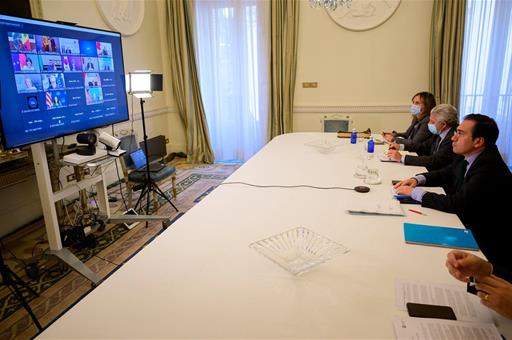Spain has been able to combine a high vaccination percentage in its own population with being a major donor of vaccines. Ninety per cent of Spanish donations have been made through the COVAX mechanism, making us its fifth largest contributor with more than 50 million doses shipped.
Spain is also the second largest donor of vaccines in Latin America, and vaccines have also been distributed in Sub-Saharan Africa, the Southern Neighbourhood and Asia. In the same vein, access to vaccination has been facilitated in humanitarian contexts, such as the recent operation for Afghan refugees in Iran. Minister Albares mentioned that "it is not only necessary to increase the distribution of vaccines, but also to strengthen national health systems".
Spain offers its experience
The Foreign Minister offered Spain's leadership in coordinating the donor response to COVID-19 in two lines of action: the fight against disinformation and support for health workers, and in two geographical regions: Latin America and the Caribbean and the Sahel.
These are two priority regions for Spanish Cooperation in which it has significant previous experience, a broad institutional deployment and where it works in close coordination with Team Europe, as well as with local counterparts, following the principle of ownership. To work in these two areas, Spain will also rely on the global COVID-19 health programme recently launched by the Spanish Agency for International Development Cooperation (AECID) in 12 priority countries.
José Manuel Albares finally stressed the need for a reform of the global health governance system, also reinforcing the leadership of the World Health Organization to prevent future pandemics.
The meeting was attended by the foreign ministers of Canada, Colombia, France, Germany, Indonesia, Italy, Japan, Korea, Saudi Arabia, Senegal, the European Commission's Commissioner for International Partnerships, as well as representatives of the African Union and the foreign ministries of Australia, India, the United Kingdom and South Africa.
This meeting, the second at a ministerial level, was determined by the need for a global, common and coordinated effort to deal effectively with the pandemic.
Discussions revolved around the previously identified gaps grouped into the six priority action lines that make up the Global Action Plan: increasing vaccination, strengthening supply chain resilience, providing accurate and truthful information on vaccines, supporting health worker safety and education, other non-vaccine therapeutic interventions, and strengthening the global health architecture.
Non official translation





